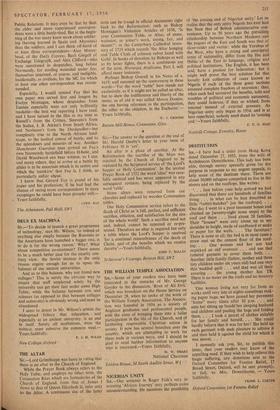WAR CORRESPONDENTS Sir,—My old friend and colleague, Gerard Fay, is
a distinguished journalist who, when he laid down his pen for a while, soldiered with distinction. So there is double weight behind his attack on war correspondents (in review- ing Eye Witness by Noel Monks in the Spectator, February 10), and a double obliga- tion on a former war correspondent to defend, not himself, but former campaigning com- panions, good journalists and brave men, who are dead now and cannot speak for them- selves.
I write only of those I knew, and knew in the field, and I am in honour bound to assure those who read Fay's review that men such as Chester Wilmot and Guy Byam of the BBC; Christopher Lumby of The Times; Evelyn Montague of the Manchester Guardian; Christopher Buckley of the Daily Telegraph; Alexander Clifford of the Daily Mail; Philip Jordan of the News Chronicle; Bernard. Gray of the Daily Mirror; and A. B. Austin of the Daily Herald, who are all now dead (most of them because they lost their lives in action, or shortened them in the field), were not to be fobbed off with 'too much hand-out stuff' or bamboozled into writing 'pure fiction, not because they made it up but because they were told a pack of lies to begin with.' They were too experienced as reporters for that, as they were too conscientious to be found only on 'the outskirts of action.'
It was chance, and not through any lack of eagerness, I know, that Fay did not himself go into action until the Normandy campaign, where he was wounded. By that time, it is true, the number of correspondents had grown, as also the self-importance of Army
Public Relations. It may even be that by then the older and more experienced correspon- dents were a little battle-tired. But at the begin- ning of the war many knew more about soldier- ing (having learned in Spain and Abyssinia) than the soldiers, and I can think off-hand of at least three correspondents—Alan Moore- head. of the Daily Express, Basil Gingell of Exchange Telegraph, and Alex Clifford—who were mentioned in despatches, long before Normandy, for tending wounded under fire: themselves unarmed, of course, and ineligible. incidentally, as civilians, for the MC for which at least one other correspondent was recotn- mended.
Especially, I would remind Fay that his own paper was served first and longest by Evelyn Montague, whose despatches from Tunisia especially were not only brilliantly readable—the best war reporting I have read, and I have turned in the files in my time to Russell's from the Crimea, Steevens's from the Sudan, J. B. Atkins's from South Africa, and Nevinson's from the Dardanelles—but completely true to the North African land- scape, to the tactical course of battle, and to the splendours and miseries of war. Another Manchester Guardian man arrived on Fay's own Normandy battlefield before H-hour, and David Woodward can bear witness, as I can. and many others, that to arrive at a battle by glider is to be uncertain which is its centre and which the 'outskirts' that Fay is. 1 think, so particularly unfair about.
I know that Gerard Fay is proud of his paper and his profession; if he had had the chance of seeing more correspondents in more campaigns he could have been prouder still.— Yours faithfully,
CYRIL RAY



































 Previous page
Previous page